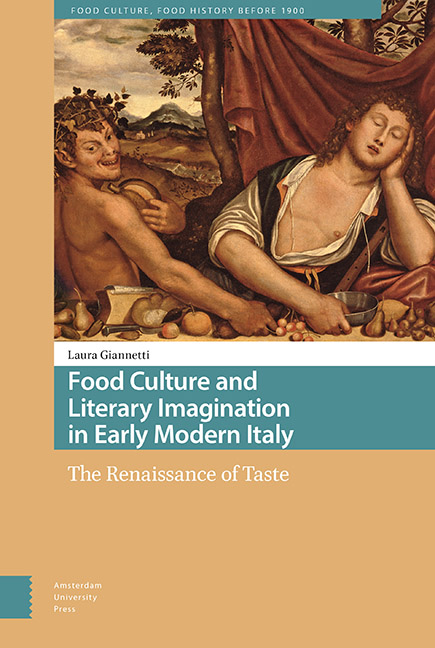4 - Femininity and Food Culture in Renaissance Italy
Published online by Cambridge University Press: 13 May 2022
Summary
Abstract
This chapter considers the often overlooked role of women's voices in the social, symbolic, and cultural meanings of food as well as women's role in relation to food culture, especially in reconsidering unequal gender stereotypes. The following pages analyze not only the way that gendered discourse on food was understood by ordinary women and men – and how food was gendered – but also how their lives were lived with gusto and pleasure. The volume concludes with three particularly revealing examples of women's voices: the letters of Isabella D’Este, of Suor Virginia Galilei, and the thoughtful, gender-sensitive treatise by Moderata Fonte. These sources provide a feminine perspective on food and permit women the final, crucial word in this study regarding how imagination and practice interacted in Italian Renaissance food culture.
Keywords: women, gusto, appetite, taste, gender
Introduction
A significant male-oriented emphasis in the written food culture of the early modern period in Italy seems almost a given. The new genre of health and food treatises in the fifteenth and sixteenth centuries featured male authors or professional cooks who published books relating their work in the kitchen for Renaissance princes and courts; these printed texts usually did not mention women except in tangential remarks. The lack of writings on food that speak to or about women means that modern studies of women and food culture or practice in the early modern period have often had to rely on prescriptive and moralistic treatises, where calls for restrained eating and prohibitions regarding women's consumption of ‘delicate’ foods were routinely restated. More recently, though, other sources have been explored by historians and art historians, who have sought to investigate the place of women at the elegant table in Renaissance courts, women-only banquets, and issues of domesticity and commensality. Finally, studies on sixteenth-century convents have explored the role nuns had in preparing various dishes that they used not just as foods but also as medicines. Nevertheless, we still know relatively little about what early modern women thought about food, how they prepared food, and the place of cooking in their everyday lives.
- Type
- Chapter
- Information
- Food Culture and Literary Imagination in Early Modern ItalyThe Renaissance of Taste, pp. 201 - 252Publisher: Amsterdam University PressPrint publication year: 2022



